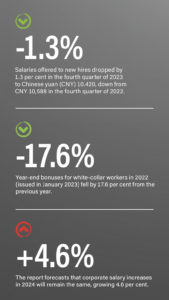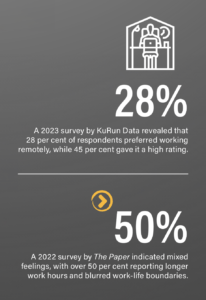
Motivating employees in challenging times
Despite gloomy headlines about the state of China’s economy and youth unemployment, the country’s employers still need to work hard to motivate and retain employees. With HR budgets stretched, companies need to be as creative as possible when it comes to rewarding staff, including by using non-financial incentives. Arendse Huld of Dezan Shira & Associates takes a look at how employees can be retained and motivated in difficult times.
The COVID-19 pandemic and post-COVID recovery have led to significant changes in China’s work culture and accelerated trends that were already impacting the labour market. While some of these changes were temporary—very few employees are still working at home—the upheaval has brought lasting changes to employee expectations.
At the same time, economic uncertainty has led many companies to tighten their belts, making it harder for them to meet employee expectations in terms of salary increases, bonuses and other financial perks.

A survey of 38 major Chinese cities in the 2023 Chinese Enterprise Recruitment Salary Report, conducted by recruitment platform Zhaopin, found that salaries offered to new hires dropped by 1.3 per cent in the fourth quarter of 2023 to Chinese yuan (CNY) 10,420, down from CNY 10,588 in the fourth quarter of 2022.[1] Meanwhile, year-end bonuses for white-collar workers in 2022 (issued in January 2023) fell by 17.6 per cent from the previous year, according to Zhaopin’s 2022 White-Collar Year-End Bonus Survey Report.[2]
Fewer companies are also providing pay increases, and average raises are more modest than in previous years. In the 2024 Resignation and Salary Adjustment Research Report conducted by 51jobs HR Research Centre, the research arm of the online recruitment platform 51jobs.com, 58.7 per cent of respondents said they provided salary increases in 2023, a decrease of 9.6 percentage points from 2022.[3]
Meanwhile, salaries increased by an average of 4.5 per cent in 2023, slowing by 0.8 percentage points from the previous year. The report forecasts that corporate salary increases in 2024 will remain the same, growing 4.6 per cent.[4]
In the face of these challenges, companies must come up with alternative ways to motivate, retain and attract new talent. Instead of financial incentives, businesses can promote a healthy work-life balance, cultivate a positive workplace environment, provide training for workers to upgrade their skills and offer career development opportunities.
China’s changing work attitudes
In China, the return to office work post-pandemic has been notable, with 72 per cent of workers attending the office at least four days a week in 2023, according to the 2023 Future Office Trends Research Report from Hassell Studio, compared to 42 per cent in the United States.[5]
While fully remote work is less prevalent, hybrid models have remained, although only to a limited extent. Companies like Trip.com Group and Nike have embraced hybrid work, citing positive impacts on staff turnover and productivity.

However, the extent of the desire for remote work options remains uncertain. A 2023 survey by KuRun Data revealed that 28 per cent of respondents preferred working remotely, while 45 per cent gave it a high rating.[6] Yet, a 2022 survey conducted by The Paper indicated mixed feelings, with over 50 per cent reporting longer work hours and blurred work-life boundaries.[7]
It is also worth considering that the preference for more flexible work arrangements may simply reflect a desire for a better work-life balance. The oft-cited benefits of work-from-home arrangements include reduced commute times and more flexible work hours, while complaints normally focus on reduced efficiency (especially with communication and problem-solving) and longer work hours. A combination of in-office and remote work may therefore be beneficial for some companies, allowing employees to save time on days when they have other commitments while also offering the more regimented structure and social benefits of the office.
Amid the economic uncertainty of the post-COVID era, job security has increasingly become a priority for employees in China.
Michael Page’s Talent Trends 2023 report released in June 2023 found that the economic slowdown was driving employees in China to look for new positions.[8] As companies tighten their belts and freeze budgets, many employees see switching jobs as their only chance of getting a promotion or earning more money.
Meanwhile, the instability brought about by the pandemic may also cause employees to feel that their positions are precarious, leading them to keep an eye on other opportunities as a kind of safety net.
This desire for stability is also reflected among younger workers. In a slight reversal of trends, so-called ‘iron rice bowl’ positions in the government and public sector are becoming popular again, with their guaranteed salaries and work hours proving increasingly attractive.
Another symptom of the demand for stability is a desire for employers to provide career progression and training. Survey results published in the Michael Page report show that a lack of career development opportunities is a major cause of high staff turnover. Whereas in the past, employees may have been attracted by certain job titles or a company’s brand, they are now increasingly likely to pursue opportunities that provide clear paths for progression.
Retaining and motivating employees during difficult times
There are a range of non-financial strategies that companies in China can use to motivate employees and improve retention amid economic uncertainty. These include cultivating a positive work environment, promoting a healthy work-life balance, assuring job stability and addressing employees’ career development needs.
Creating a positive work environment is paramount to improving employee retention. It requires proactive measures on the part of senior management to resolve conflicts promptly and take employee concerns seriously. For instance, regular performance reviews provide an outlet for employees to voice their opinions on current work responsibilities and team dynamics, while allowing the employer to give useful guidance and recognise employee achievements.
Transparency and communication are also paramount during periods of uncertainty. Openly discussing company setbacks and their implications for employees, such as freezes on bonuses, promotions, hiring or travel, helps to foster trust and manage expectations. It is also important to establish channels of communication for employees to express their views and difficulties, and to ensure that concerns are heard and addressed promptly.
Promoting a healthy work-life balance for employees can also help to reduce pressure in times of economic uncertainty. Companies should carefully manage workloads and ensure that staff are given realistic targets.
Companies may also consider providing mental health support, especially if their employees are likely to face financial pressures (in the Michael Page survey, 40 per cent of respondents reported feeling pressured by the rising cost of living). Support could include offering counselling services, workshops, and resources such as additional healthcare coverage or access to wellness facilities. Providing additional days off, family days or designated mental health days can also contribute to employee wellbeing.
Regular feedback and guidance also play a crucial role in reducing anxiety related to job instability. By offering transparent discussions regarding career progression, employees gain a clearer understanding of their roles and potential growth opportunities. This transparency builds trust and loyalty and can help contribute to overall job satisfaction.
While pay increases may not be on the table, companies should still strive to provide compensation structures that are as stable as possible. It is important to note that in times of economic uncertainty employees may be less willing to accept forms of compensation that are less certain, such as stock options and equity, and will instead be looking for more tangible and stable salary and benefit structures.
Training and upskilling initiatives should also form part of a company’s talent strategy. In addition to demonstrating a commitment to professional development, they will increase the skill level of a company’s employees and boost productivity.
In formulating effective training programmes, companies can consult staff on their career goals and work to identify current skill gaps within the business. Emphasising internal role transfers and promotions also reinforces the idea that the company values and invests in its existing talent.
Providing the option of flexible or hybrid work arrangements can also help reduce stress for employees who benefit from a change in work environment. Whether through remote work options, flexible hours or compressed work schedules, accommodating individual preferences enhances job satisfaction and reduces stress associated with rigid work structures.
These options may be particularly important for employees who have specific needs, such as those with young children or employees with disabilities. Recognising the individual needs of employees can help to improve their comfort, as well as foster trust and a sense of belonging in the company.
Companies may also consider providing internal support services and assistance with accessing public services to employees with special needs. This in turn will help to further demonstrate a commitment to inclusivity and well-being.
Finally, to attract and retain younger talent, companies should highlight stability and career growth prospects. Emphasising long-term opportunities for advancement within an organisation aligns with the evolving expectations of younger workers and may contribute to increased job satisfaction and loyalty.
Dezan Shira & Associates assists foreign investors in China and has done so since 1992 through offices in Beijing, Tianjin, Dalian, Qingdao, Shanghai, Hangzhou, Ningbo, Suzhou, Guangzhou, Dongguan, Zhongshan, Shenzhen, and Hong Kong.
The company has offices in Vietnam, Indonesia, Singapore, the United States, Germany, Italy, India, and Dubai (UAE), as well as partner firms assisting foreign investors in the Philippines, Malaysia, Thailand, and Bangladesh.
[1] Chinese Enterprise Recruitment Salary Report (2023), Zhaopin, 3rd January 2024, viewed 12th January 2024, <https://mp.weixin.qq.com/s/Hv2FPpvq_p36_4m89bSL9A>
[2] 2022 White-Collar Year-End Bonus Survey Report, Zhaopin, 17th January 2023, viewed 12th January 2024, <https://mp.weixin.qq.com/s/90TY3B0YE-9Mzf3e1fWqGw >
[3] 2024 Resignation and Salary Adjustment Research Report, 51jobs HR Research Centre, 2024, viewed 12th January 2024, <https://research.51job.com/pdf/resign/2024/total.pdf>
[4] 2024 Resignation and Salary Adjustment Research Report, 51jobs HR Research Centre, 2024, viewed 12th January 2024, <https://research.51job.com/pdf/resign/2024/total.pdf>
[5] Davis, D, Adaptive Strategies for Change: 2023 Future Office Trends Research Report, Hassell Studio, August 2023, viewed January 12th 2024, <https://go.hassellstudio.com/Great-Adaptations-2023-Report>
[6] Work from home vs. work from office, KuRun Data, 3rd February 2023, viewed 12th January 2024, <https://www.kurundata.com/en/news_detail/318305874033.html>
[7] Chen, L, Wang, Y, Zhang, J, Why is working from home making us busier?, The Paper, 9th June 2022, viewed 12th January 2024, <https://www.thepaper.cn/newsDetail_forward_18495648>
[8] Xing, P, Talent Trends 2023 | Mainland China | Invisible Changes, Michael Page Group, 6th September 2023, viewed 12th January 2024,<https://www.michaelpage.com.cn/advice/management-advice/hiring/1007295>


Recent Comments